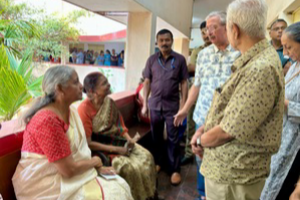The total reform of the school system is an imperative necessity for the country at this juncture. The imminent demise of the political superstructure ought to result in a more flexible, transparent, humane, and valueoriented education Education in the 21st century has become a valuable commodity that is monopolised and marketed by the school, it will be still more expensive in the near future. Throughout the country, the cost of educating a child has risen enormously.
The time has come to realise the role of teachers in our society, their background, orientation and competence for producing future citizens. The horrifying news some years back, that a teacher can beat a student to death simply because of his inability to complete homework, is hideous. This indicates that some teachers do not even possess the basic human qualities and have neither tolerance nor affection. This is extremely unfortunate. Barring few exceptions, most teachers in our country lack the proper mental makeup and orientation. No suitable mechanism has so far been evolved to assess their efficiency.
Statistical data reveals that examination related suicides of teenagers are the highest in West Bengal. Parents, grandparents and relatives of school children are bewildered over the militant attitude of incompetent teachers. Even some good students are traumatised by the unscientific examination system. It is unfortunate that no significant pedagogic innovations have been effected by the teachers, many of whom are just complacent. The success of the Right to Education Act will depend mainly on the quality of teachers. It is necessary to create an “All India Teachers Service” and to recruit meritorious candidates through a central selection board. A substantial salary should be paid to the qualified teachers.
This is essential in order to achieve quality education. There is no substitute for good teachers. Technology and other ingredients only act as a catalyst in the minds of children. We have enough young minds in our country with the propensity to learn, but few qualified teachers to teach them with care and affection. The education system has two organs. One, is its administrative component, the other is academic. The total binocular vision of education can be visualised through these twin perspectives. Due emphasis must be given to the training of teachers.
The HRD ministry may even consider constituting a commission for elementary education (like the Sadler’s Commission of the pre independence period) to conduct an overview of the pros and cons, ramifications, strength and weakness as well as limitations of the RTE policy. No less important is school management. NCERT, which has been doing commendable work for half a century, in the development of pedagogy, educational technology, preparation, publication of text books and teacher manuals, training of teachers, should take a leading role in this regard. The National University of Educational Planning and Administration (NUEPA) needs to look into the quality of education through continuous evaluation and research. The NUEPA can also help the child to acquire the cognitive skill of ‘knowledge economy’ in future.
There is organized anarchy and corruption in the field of education. The scenario during the 34 years of CPI-M rule in West Bengal was dismal. In the Education Development Index (EDI), West Bengal was ranked in the 33rd position, barely ahead of Jharkhand and Bihar. A radical change in elementary education is absolutely necessary for the generations to come. The meaningful implementation of the Right to Education should go a long way towards development. The formal education system should be given its due importance. The school examination system should not be done away with. Half-yearly, annual and Board examinations from the primary to the Higher Secondary level should not be scrapped to make the situation worse.
As a matter of fact, examination and evaluation will eventually help the children to know their strength and weakness in a subject. Inculcating a scientific attitude, learning by doing, improvising scientific equipment available from local resources for experimentation, observation and drawing inference will yield good results. Educational development should be viewed as a journey to achieve freedom. It is a process of generation and realization of new opportunities. Sustained development, however, is a continuous process. Imparting proper education is a deliberate, spontaneous, process. It enlarges abilities. Social goals and social content of education appear to be equally important. Freedom of education can ultimately lead to human freedom and its total development.
It is a glorious journey from untruth to truth, from darkness to light, from ignorance to consciousness. Freedom through education is necessary in our country with 424 million illiterates. Around 35 million children, aged between six and 10, do not even attend school, and about 40 per cent drop out before reaching class five. In tertiary education, the enrolment is only six per cent. If advancement of human freedom is our main objective and means for total development, it is imperative that we should re-examine our education policy, particularly for rural and backward sections. It is necessary to initiate a qualitative improvement programme in the field of education, right from the primary to higher education levels immediately, if indeed nation-building development is our aim.
Imparting value oriented education to the child, keeping in mind the philosophy of education is not an easy task. Developing the imagination, a hallmark of quality in education, is today a distant dream. Formulation of the objectives of education has an important social function in focusing its efforts in a specific direction. Education should be regarded as a continuous process and education is no longer an activity other than social reform. Mahatma Gandhi’s buniadi education, Swami Vivekananda’s overall development of humanity, educational epistemology as perceived by Tagore, should be blended uniquely in the implementation process of this new scheme.
According to Tagore, freedom of mind is most important than anything else, absorbing profoundly the essence of environment. The value of freedom is an element of the humanistic perspective life. Promotion and development of the human potential at the social and individual levels, particularly for the young is imperative. In order to implement this type of education we require a large number of qualified and devoted teachers with a sense of morality, values and ethics.
(Concluded)
(The writer, a former Reader in Chemistry at Presidency College, Kolkata, was associated with UGC and UNICEF)










